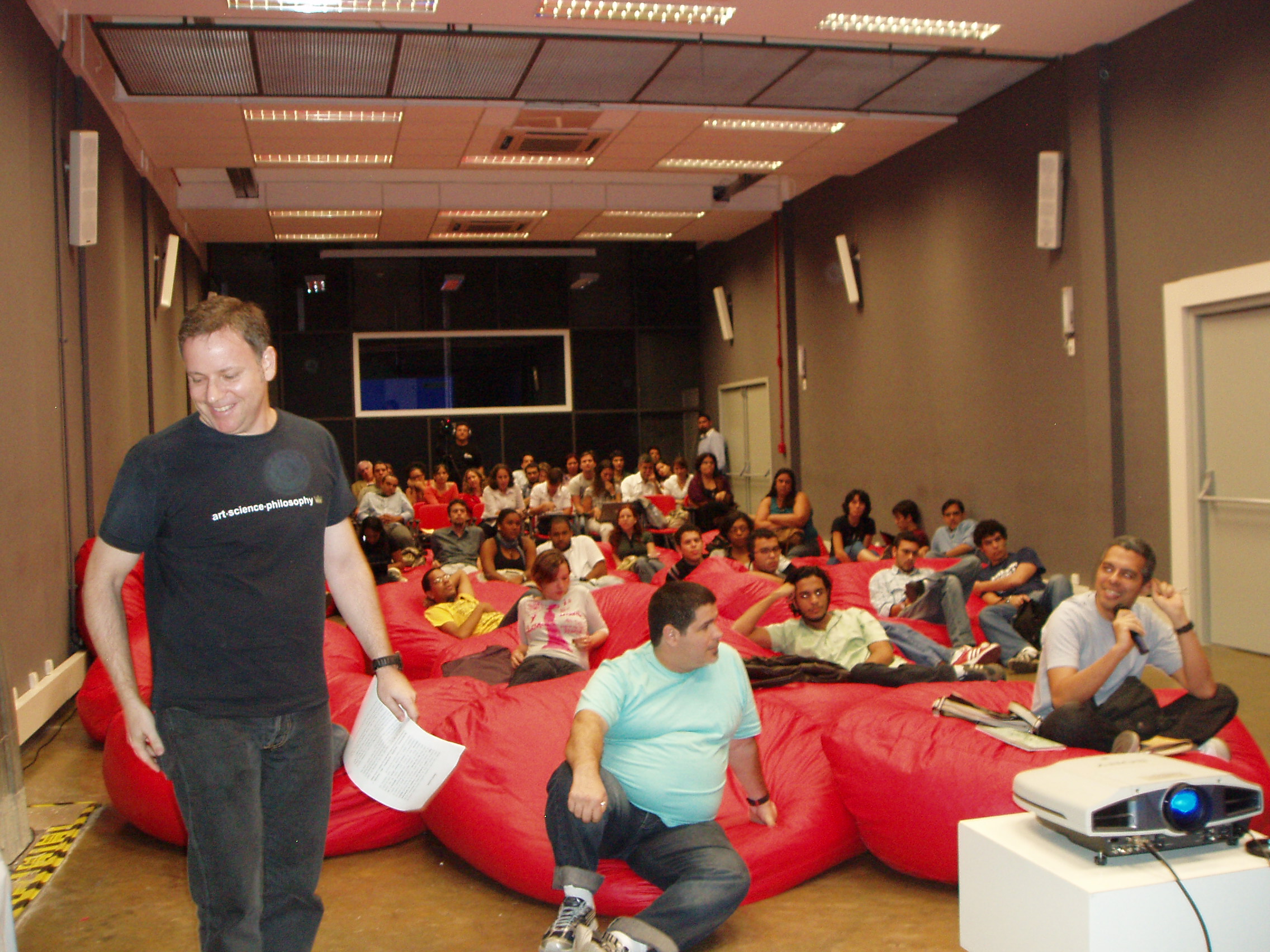Coinciding with my second visit to Brazil, Thiego Novaes translated my inaugural speech from 2005, the Principles of Notworking, that also made it into French, Dutch and Italian. Here it is. Felipe Fonseca responded to my Creative Commons report on this blog. Giselle Beiguelman sent me a link to a Flickr collection of that evening and a bit more context on the net-trends page at xing. Next morning I left for Rio, a short flight, where I met Sarita Albagli (who invited me to come to Brazil this time), Dan Schiller (whom I never met) and Yann-Moulier Boutang (Multitudes, Paris) and others for lunch. After a brief stroll through Leme I attented the keynote speech of Sandra Braman, whose policy and legal discourse on the “emerging global information regime” took an interesting turn towards bodily and culinary metaphors — no doubt because of her two months residency in Rio de Janeiro. The program of the two day conference called Information, Power and Politics that followed you can find here. It was held in an old building (404 Av. Pasteur), that houses the Mineorology Authority.
My own pesquisa dealt with the response of activist media to Web 2.0 and the necessary move we all have to make from the centralized corporate platforms to much more flexible, open environments: social networking as tools that can easily be installed. Xing is a hybrid form (while still centralized and corporate) but Crabgrass is promising initiative in this direction. Just think of the move from the blogger.com (controlled by Google) to the WordPress floss software. Or the idiotic IPO hype around the Netscape browser in 1995 and the positive turn it took with Firefox. In terms of Twitter and the micro-blogging I argued, with Virilio, for a move towards ‘slow politics’. We can’t go faster then the speed of light anyway. It is OK if Twitter further erodes the power of the global news agencies. This is essentially what I also suggest in my essay Blogging, the Nihilist Impulse. What blogging and twittering does is undermining the centralized meaning structures of the 20st Century. We could agree that this is necessary deconstruction work. However, it does not resolve the issue how to organize dissent. Going faster, talking to more people by itself will not do the job. It will neither bring ‘digital democracy’ nor strenghten militant struggles. Speed politics is useful once you’re up to speed. In order to get going you need other concepts and social practices.
The next evening I attended the launch of the Portuguese translation of Richard Barbrook’s Imaginary Futures. Richard gave an impressive lecture on the topic. It’s always good to go back to the history of cybernetics, the Cold War (and the role liberal-leftist intellectuals played in it). How dull and backward looking the free market ideology of today looks like with the promises of the 1950s and 60s! In my response I asked why there is so little known about the history of the computer and the Internet and contemplated about the rapidly growing gap between the mass practices of many 100s of millions of users and the hand full of us that theorize it.

My last evening was spend at the newly established NAVE school (see picture above), a new media college for high school kids age 15-18, packed with the latest equipment. NAVE is housed inside an old telephone switch building of Oi, the biggest telco in Brazil that sponsers the school and get first-hand feedback of the teachers and staff in all matters digital. NAVE seems to be one of the public-private partnerships that has to figure out how to renewal Brazilian education. Here you can see the competition for their interactive facade. NAVE was founded, as is still coordinated by Oi Futura, the Oi research lab/organization that is based in Flamengo, elsewhere in Rio. Besides math and Portuguese the emphasis lies on Internet skills and game design. On this ocasion I spoke about the ‘creative subcurrent’ of our Institute of Network Cultures, from A Decade in Webdesign early 2005, Rosalind Gill’s research into the working condition of webdesigners to MyCreaticity to the recent work of the Creative Labour group at Wintercamp that discussed how organize precarious labour inside the Creative Industries.


